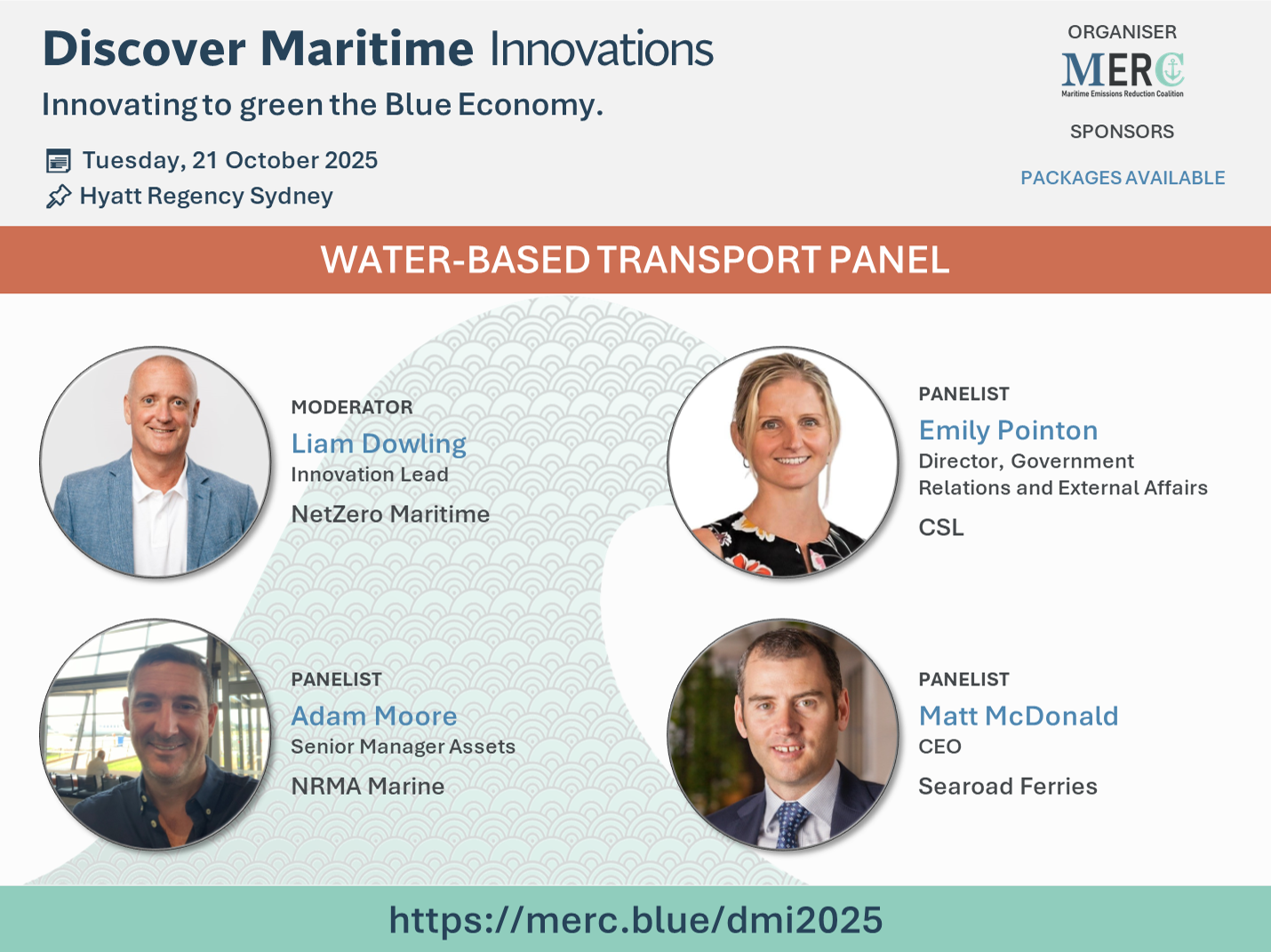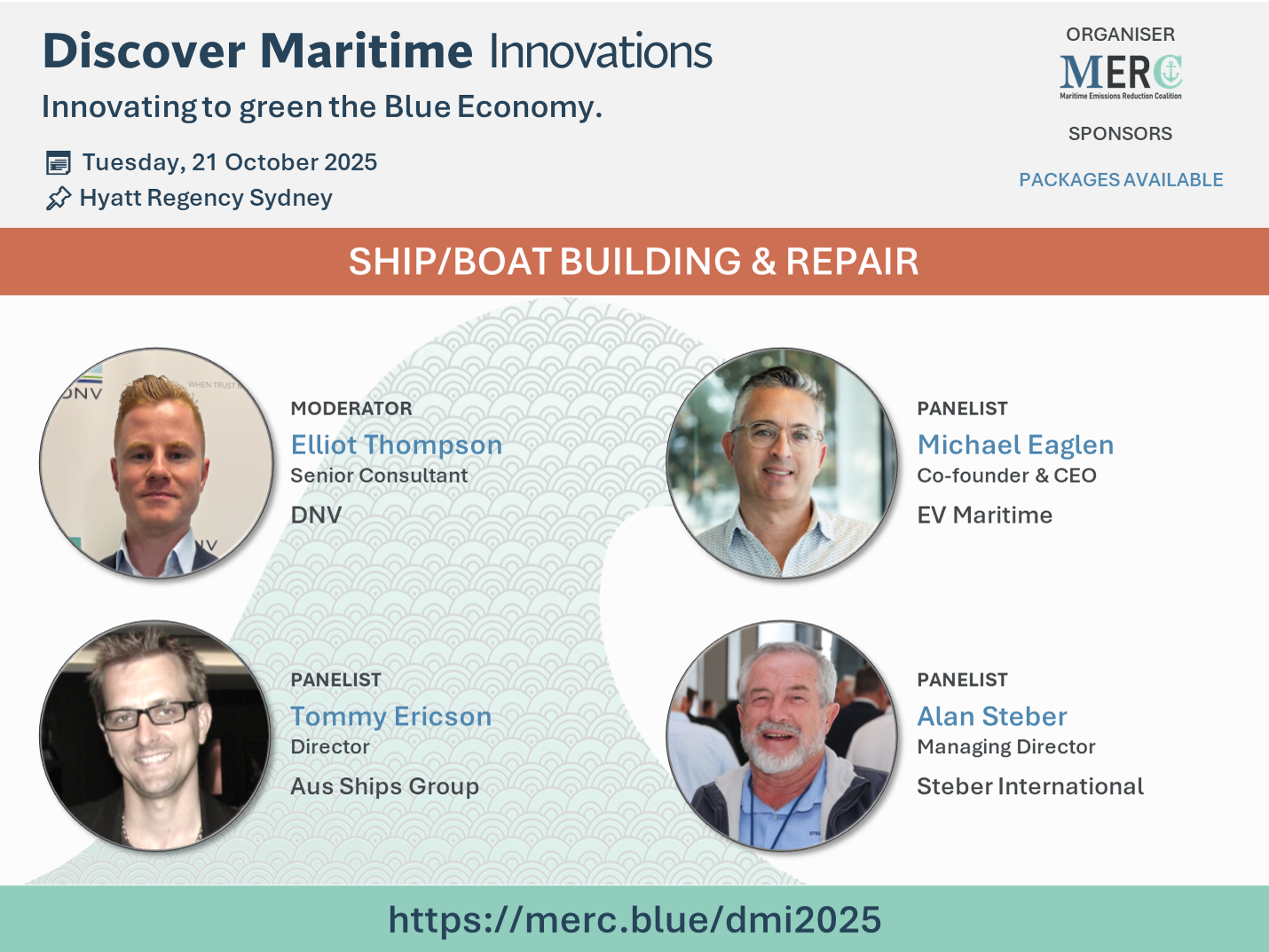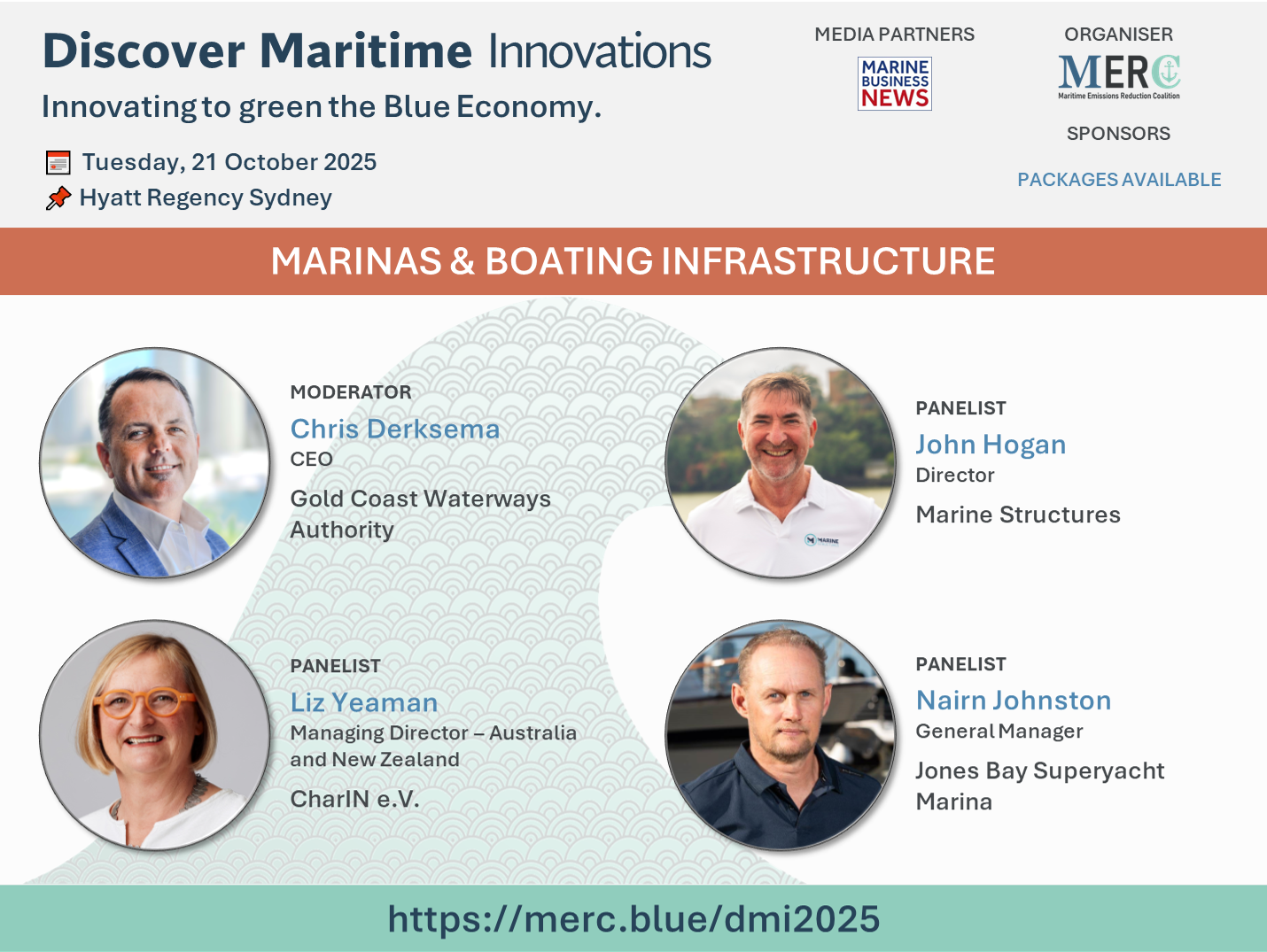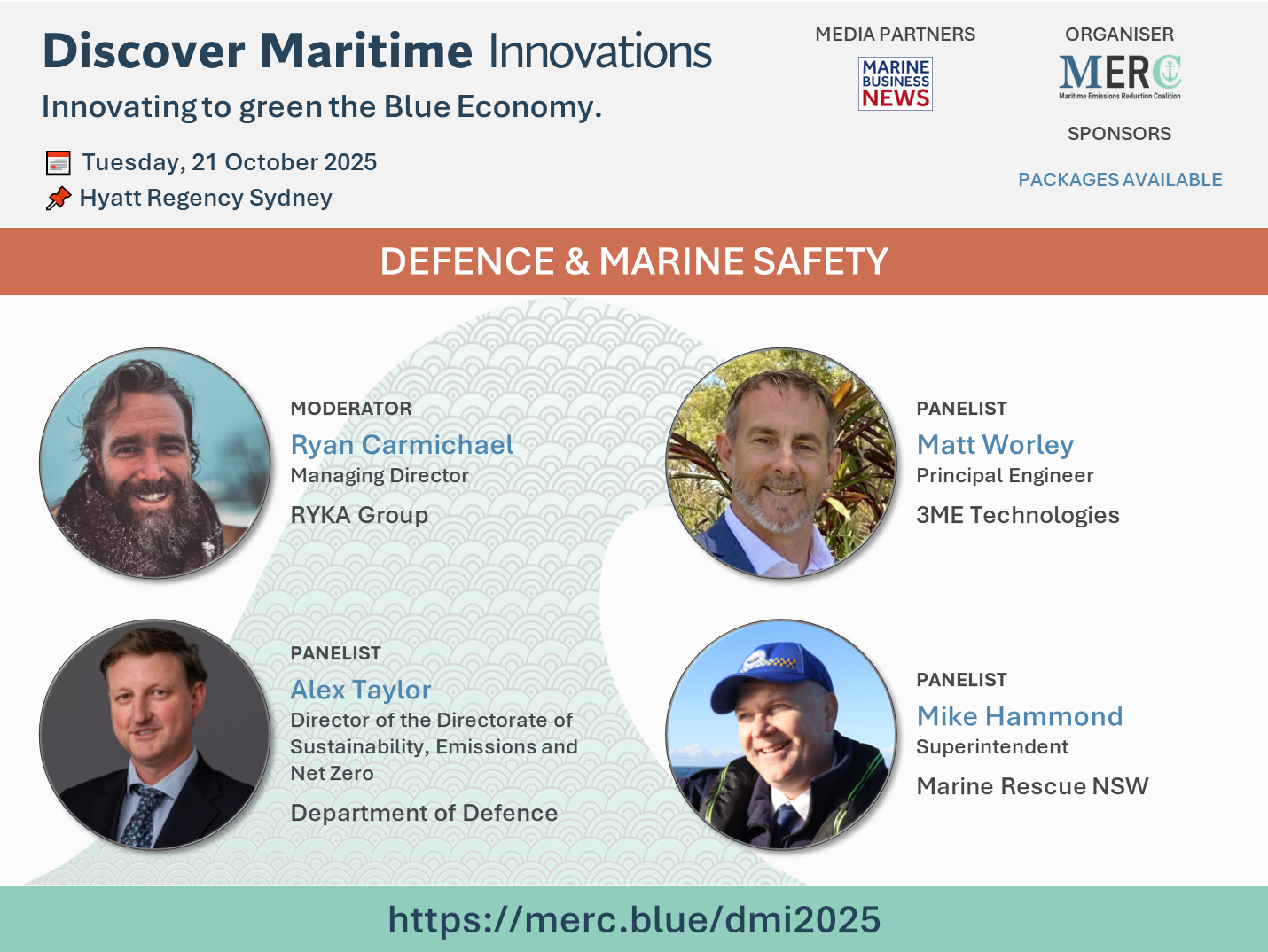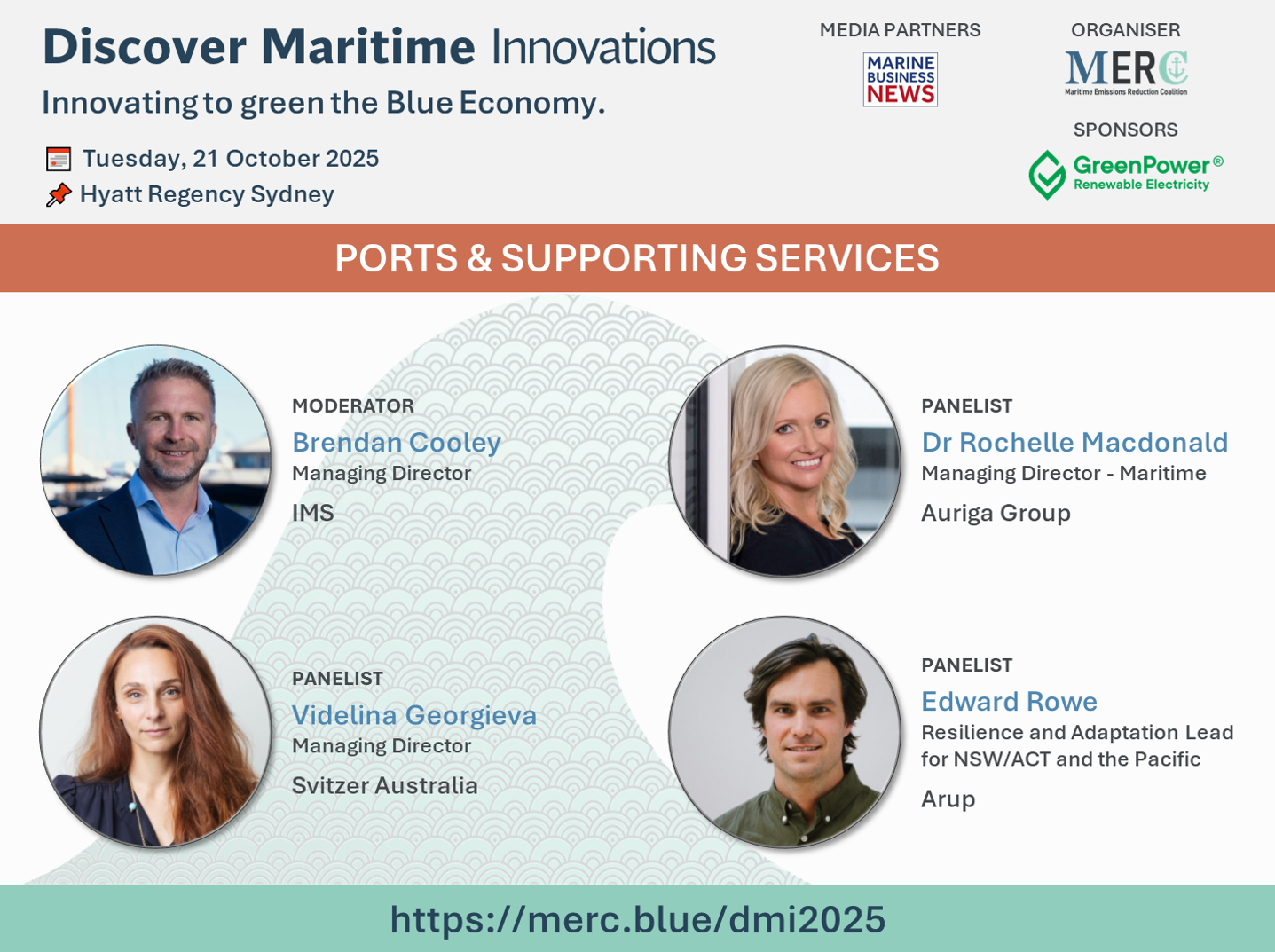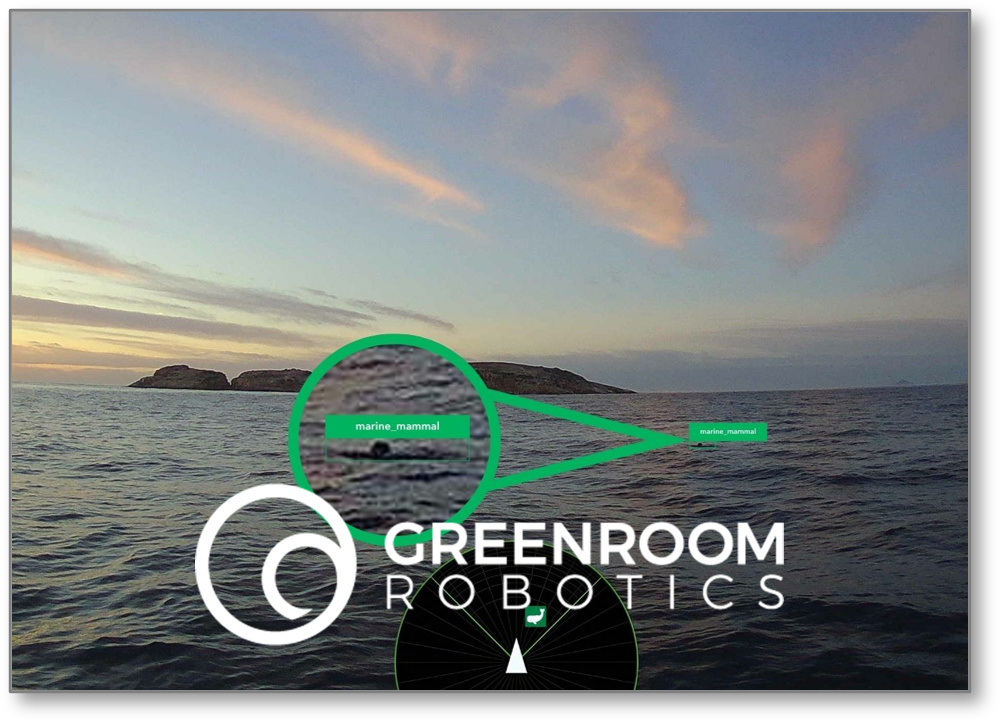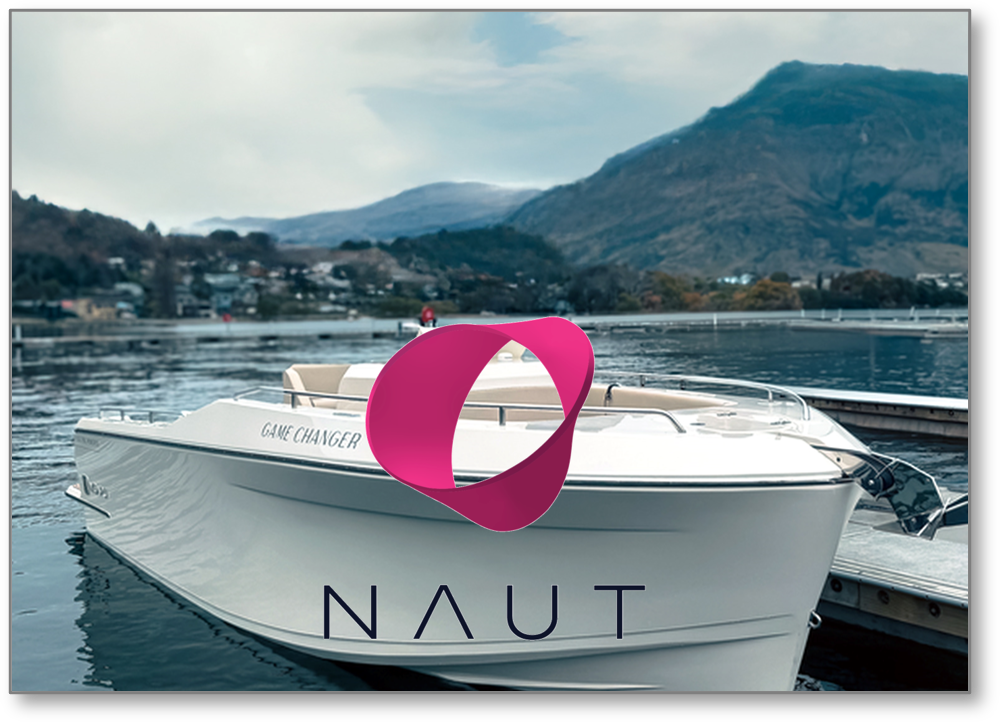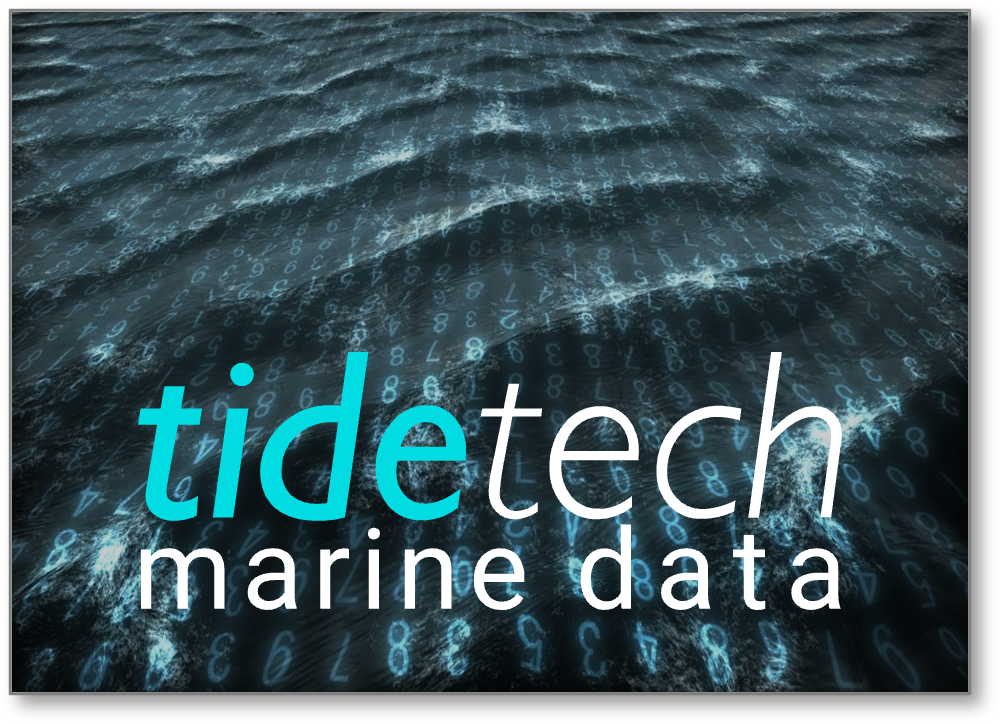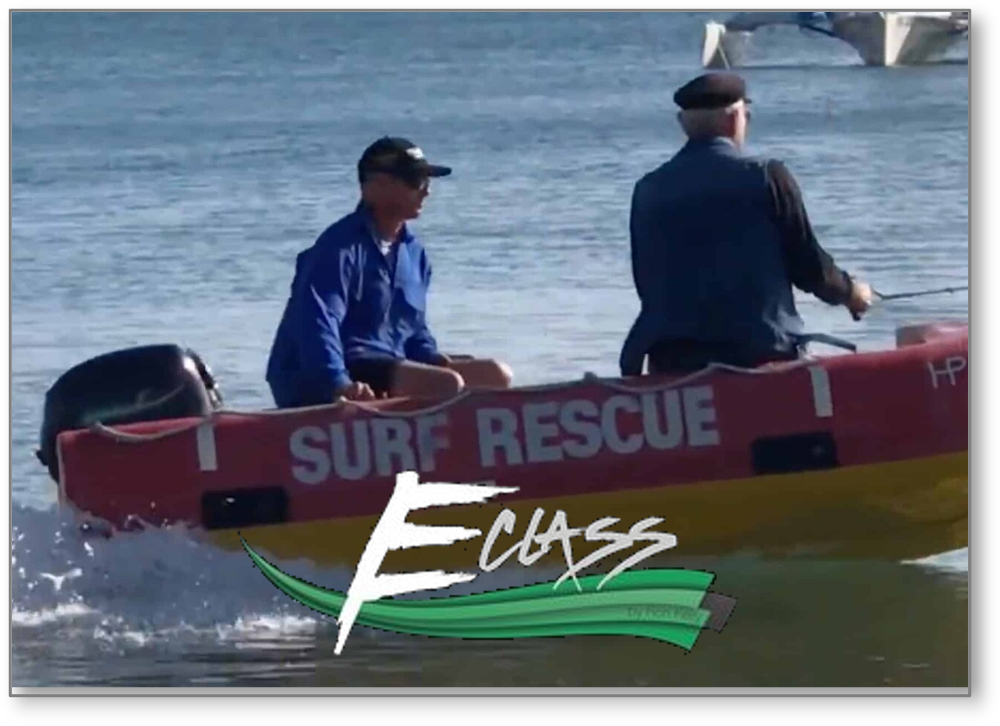Innovating to green the Blue Economy.
📅 Tuesday, 21st October 2025 📌 Hyatt Regency Sydney, Australia
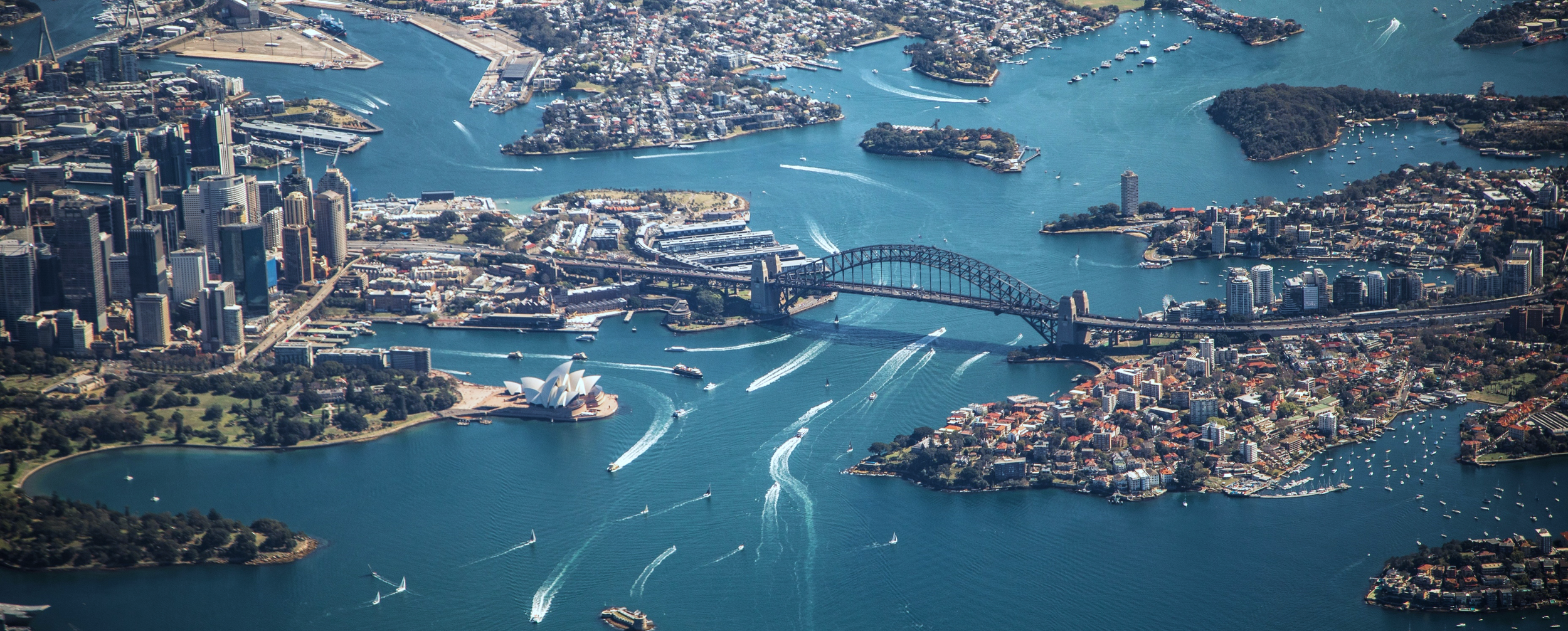
Program
Announced Panels
Event Program
8:15 - 9:00
Registration and Coffee
9:00 - 9:10
Welcome
9:10 - 9:30
Maritime Innovation Keynote (TBC)
9:30 - 9:50
Innovation Talk - Global Outlook for the Maritime Energy Transition in Ferries
Michael Eaglen, EV Maritime
EV Maritime is a design, technology and consultancy firm with a global perspective on ferry electrification. It initiated Auckland’s low-emission ferry programme, helped catalyse ferry electrification in Parramatta, Manly and Brisbane, secured contracts for new vessels in the USA, and has advised governments, development banks, transit agencies and operators across Australasia, Southeast Asia, North America and Europe on hybrid, electric and hydrogen ferry systems.
Its flagship 200-passenger fast ferries, launched for Auckland Transport, are designed to prove the global case for electrification in high-frequency ferry networks — and to reshape the economics of clean transit. Built on a modular platform, they show how standardisation can act as a lever for global scale and long-term commercial viability.
CEO Michael Eaglen shares his global outlook on the maritime energy transition.
9:50 - 10:10
Innovation Talk - Implementing Auckland's Electric Ferry Network
Liam Dowling, NetZero Maritime
Liam Dowling discusses his experiences and lessons learned through NetZero Maritime’s operationalisation of electric vessels in Auckland’s ferry network on behalf of Auckland Transport. He will explore practical insights gained from integrating three different electric vessel designs into the fleet simultaneously, as well as the deployment of supporting charging infrastructure. Learn about operational trials, resilience testing, and how businesses and stakeholders must adapt to the challenges and opportunities presented by emerging on-water technologies.
10:10 - 10:40
Morning Tea and Networking
10:40 - 11:40
First set of Maritime Subsector Panels
Marine Tourism
Elisa-Marie Dumas (M)
Ocean Impact Organisation
Nick Tyrrell
GoBoat
Anthony Haworth
SeaLink Marine & Tourism
Dominic May
CoastXP
Ports & Supporting Services
Brendan Cooley (M)
IMS
Videlina Georgieva
Svitzer Australia
Dr Rochelle Macdonald
Auriga Group
Edward Rowe
Arup
Defence & Marine Safety
Ryan Carmichael (M)
RYKA Group
Alex Taylor
Department of Defence
Matt Worley
3ME Technology
Mike Hammond
Marine Rescue NSW
Offshore Wind & Marine Construction
11:40 - 12:40
Second set of Maritime Subsector Panels
Marinas & Boating Infrastructure
Chris Derksema (M)
Gold Coast
Waterways Authority
John Hogan
Marine Structures
Liz Yeaman
CharIN
Nairn Johnston
Jones Bay Superyacht Marina
Water-Based Transport
Commercial Fishing & Aquaculture
Tricia Beatty (M)
Fish Beatty Consultancy
David Carter
Austral Fisheries
Ewan McAsh
Oceanfarmr
Dr David Sterling
Ella Mae Fishing
Ship/Boat Building & Repair
Elliot Thompson (M)
DNV
Michael Eaglen
EV Maritime
Tommy Ericson
Aus Ships Group
Alan Steber
Steber International
12:40 - 13:40
Lunch and Networking
13:40 - 13:45
Welcome Back
13:45 - 14:05
Innovation Talk - Increasing Fuel Efficiency of Maritime Transport with Underwater Robotics
Tom Loefler, Hullbot
Hullbot develops autonomous underwater robots that proactively inspect and clean vessel hulls to prevent biofouling. This reduces drag, cutting fuel use and CO₂ emissions by up to 16%, while enabling a transition to higher performing and less polluting hull coatings. Hullbot also lowers the risk of spreading invasive species, offering flexible, on-schedule cleaning that delivers measurable environmental and economic benefits worldwide. Hullbot has completed over 700 vessel cleans worldwide and has validated case studies showing the measurable benefit to fleet operators.
14:05 - 14:25
Innovation Talk - Cutting Emissions on Hydrographic Survey by 80%
Zac Pullen, Greenroom Robotics
Powered by Grrenroom Robotics software, EGS Survey Australia have deployed a 12-metre autonomous USV to conduct hydrographic surveys traditionally completed by 55-metre crewed ships. This real world deployment resulted in an 80% reduction in fuel consumption and associated emissions for an identical survey scope.
This approach delivers more than emissions savings. It reduces operational costs, improves safety by removing crew from risky environments, and enhances data collection continuity through persistent operations. Our work demonstrates that decarbonisation is not only feasible in the near term, but also commercially viable.
This is a practical, proven pathway to reducing the maritime sector’s environmental footprint, especially relevant for ports, offshore energy, coastal infrastructure and national hydrographic services seeking sustainable alternatives for ongoing data acquisition and seabed mapping.
14:25 - 14:45
Innovation Talk - Enabling Marine Electrification Through Practical Innovation
Fiona Bycroft, Naut
Naut is part of a group of companies that has had electric vessels on the water for over a decade, including Australasia’s first electric passenger ferry. With ten years of hands-on experience, we’ve encountered the real-world challenges of electrification - and we’ve developed solutions that solve them.
Our propulsion system is boat- and final-drive agnostic, enabling operators to choose the vessel that best suits their mission - whether for marine tourism, passenger transport, aquaculture, defense or recreational - while still benefiting from a proven, powerful electric drive. This flexibility lowers barriers to adoption and puts the operator’s needs at the center.
Rather than repeating operator stories, this talk focuses on how practical, scalable innovation from the supply side can unlock industry-wide decarbonisation. Fiona Bycroft, CEO and Co-Founder of Naut, will speak to how innovation -when aligned with users, boat builders, and funders - can move us from one-off pilots to confident, fleet-level transitions. She will also explore how electric propulsion can act as a platform for wider collaboration -working alongside other innovators to integrate complementary marine sustainability technologies and build a connected innovation ecosystem that serves the sector as a whole.
14:45 - 15:05
Innovation Talk - Layer by Layer: Building the Maritime World with Large Format 3D Printing
Joshua Wigley, Hyperion Systems
The maritime industry is at a pivotal juncture, seeking sustainable and efficient solutions to meet decarbonisation goals. Large-format 3D printing emerges as a transformative technology, offering rapid prototyping, reduced material waste, and the utilisation of sustainable materials.
In this presentation, Joshua Wigley, CEO & Founder of Hyperion Systems, will delve into how Hyperion Systems harness large-format 3D printing to innovate in the maritime sector. Applications span from constructing lightweight, durable boats and unmanned surface vessels (USVs) to developing modular pontoons and drydocking infrastructure. By integrating robotics and automation, they have streamlined production processes, achieving significant reductions in carbon emissions and operational costs.
15:05 - 15:25
Innovation Talk - Electrifying the Maritime Energy Ecosystem
John Welsh, Ampcontrol
Electrification will play a key role in decarbonising the maritime sector and meeting upcoming emission reduction targets. To successfully transition the industry, the entire energy ecosystem needs to be considered, from grid supply infrastructure to dockside chargers to the electric drivetrain and energy storage on board each vessel.
Small vessels can utilize existing shore supplies using portable or on-board chargers. But larger vessels or larger fleets will require infrastructure upgrades that range from the installation of dockside CCS2 chargers through to high-voltage grid connections inclusive of transformers, switch-rooms and megawatt-level chargers. Such electrical infrastructure faces the challenge of being robust against environmental conditions and maintaining electrical safety for operators and nearby commuters. Designs must carefully consider equipment construction materials, IP ratings and cooling requirements and may leverage autonomous or wireless charging solutions to improve operational efficiency and ensure the safety of operators.
Integration of BESS-assisted chargers is explored to promote grid stabilization and mitigate the need for grid infrastructure upgrades.
Energy as a service (EAAS) is discussed as an opportunity to reduce CAPEX for the operator through a long-term service agreement. This allows expedited access to emission reduction technologies while the service provider leverages the strong ROI of electrified operations.
15:25 - 15:55
Afternoon Tea and Networking
15:55 - 16:00
Welcome Back
16:00 - 16:20
Innovation Talk - Efficient Voyage Optimisation and Emissions Reduction
Roger Proctor, Tidetech
Voyage optimisation is about making every decision 'right' when it comes to speed and route. This requires accurate understanding of two things: the environment (i.e. accurate weather/oceanic data), and vessel behaviour, which maritime-specific AI can now give us. Tidetech and DeepSea have combined to provide services which enable fuel savings and emissions reductions for all aspects of voyage optimisation. We will discuss the range of environmental data, from global to regional, provided as drivers for the AI optimisations and show how AI-powered voyage planning, and vessel optimisation, makes a difference to both long oceangoing voyages and shorter, coastal voyages.
16:20 - 16:40
Innovation Talk - Embracing Low Carbon Liquid Fuels on the Path to Net Zero
Cliff Kemmett, Refuelling Solutions
Refuelling Solutions is leading the charge toward decarbonisation by developing localised production and supply chains for home-grown, low-carbon liquid fuels. These efforts are creating domestic jobs, supporting regional economic growth, and delivering tangible environmental benefits. We recently completed a landmark trial using Renewable Diesel (HVO100) in commercial fishing vessels, demonstrating its viability as a direct, drop-in replacement for mineral diesel with immediate greenhouse gas emissions reduction potential and its value in helping operators meet ESG targets on the journey to net zero.
16:40 - 17:00
Innovation Talk - Decreasing Catamaran Fuel Use, GHG Emissions and Biofouling
Ross Roberts, GILLS Australia
GILLS ship technology is a new technology that utilizes a patented vortex generator which decreases frictional drag of the hull, to reduce ship fuel consumption, GHG emissions and hull biofouling, thus improving the global marine environment whilst saving the shipowner money. Unlike other forms of air lubrication, it works on smaller vessels with more vertical shapes, such as catamarans.
17:00 - 17:20
Innovation Talk - Rethinking the Marine Trades for Electric Adoption
Lynelle Johnson, EClass Outboards
Traditional marine trades must adapt to support the shift to electric and hydrogen propulsion for recreational vessels. While internal combustion engines remain, training pathways for electric systems are lacking. Australia, with 1,200 marine mechanics and only 0.01% electric boats, trails Europe’s predicted annual growth rate of 13.2% in electric boats. EClass Outboards accelerates adoption by retrofitting familiar outboard casings with zero-emission motors, using existing parts and enabling conversions in under an hour. This model reduces consumer risk, creates income for local technicians, and can scale globally with minimal investment. It’s an award-winning approach, and partnered with QLD TAFE, it facilitates training modernization.
17:20 - 17:30
Conference Wrap-up
17:30 - 18:30
Networking Drinks



